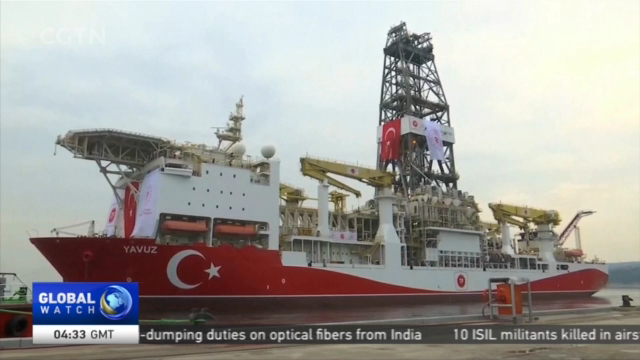
13:17, 13-Aug-2019
Drilling in Cyprus: Turkey sending 3rd ship within a month for drilling
Updated
13:34, 13-Aug-2019

Turkey is sending another gas drilling ship to offshore Cyprus, the third within a month. While the EU threatens sanctions, Turkish officials in the divided island's north say Turkey has a right to drill and explore offshore. CGTN's Stephanie Freid in Cyprus has the latest.
When Turkey deployed the Fatih and Yavuz gas and oil prospecting ships to the waters off Cyprus's coast in July, the EU called the move illegal and threatened to cut hundreds of millions of dollars in loan money to Turkey.
Cypriot President Nicos Anastasiades accused Turkish Petroleum Corporation of economic invasion. Weeks later, Turkey's seemingly unfazed government announced it is deploying a third ship.
DEMETRIS SAMUEL, SPOKESPERSON CYPRUS FOREIGN MINISTRY, NICOSIA "Turkey has received a message which came loud and clear from the international community - not only the European union - we hope that they can read the message and also understand that it's in their interest to stop this illegal activities."
KUDRET OZERSAY, FOREIGN MINISTER TURKISH REPUBLIC OF CYPRUS "Turkish Cypriots should wait until the settlement and when the settlement is found, they will be able to use these resources. This is unacceptable and this is not fair."
Cyprus was partitioned in 1974 - The northern or Turkish Republic side covers a third of the island's territory and makes up about 18% of the 1.1 million population.
The Greek Cypriot south covers two-thirds of the island and is internationally recognized.
Major issues including some around maritime zones and energy exploration keep the two sides in perpetual dispute.
STEPHANIE FREID NICOSIA, CYPRUS "The situation gets more complicated. As Turkey sends a third ship to the area, leaders of the two sides are sitting down to talk peace for the first time in two years."
They'll meet again, trilaterally in New York, this September with UN Secretary General Antonio Guterres. Turkey's gas exploration infuses pressure on both sides to find pathways to negotiations. One local analyst sees two possible outcomes:
ZENONAS TZIARRAS POLITICAL ANALYST "Resolve the Cyprus problem. We enter into negotiations and talk about it and have a comprehensive solution or we have some ad hoc agreement on energy alone or maritime zones alone that would de-escalate the whole conflict."
Alternatively, the situation could escalate further. Stephanie Freid, CGTN, NICOSIA, CYPRUS.
SITEMAP
Copyright © 2018 CGTN. Beijing ICP prepared NO.16065310-3
Copyright © 2018 CGTN. Beijing ICP prepared NO.16065310-3